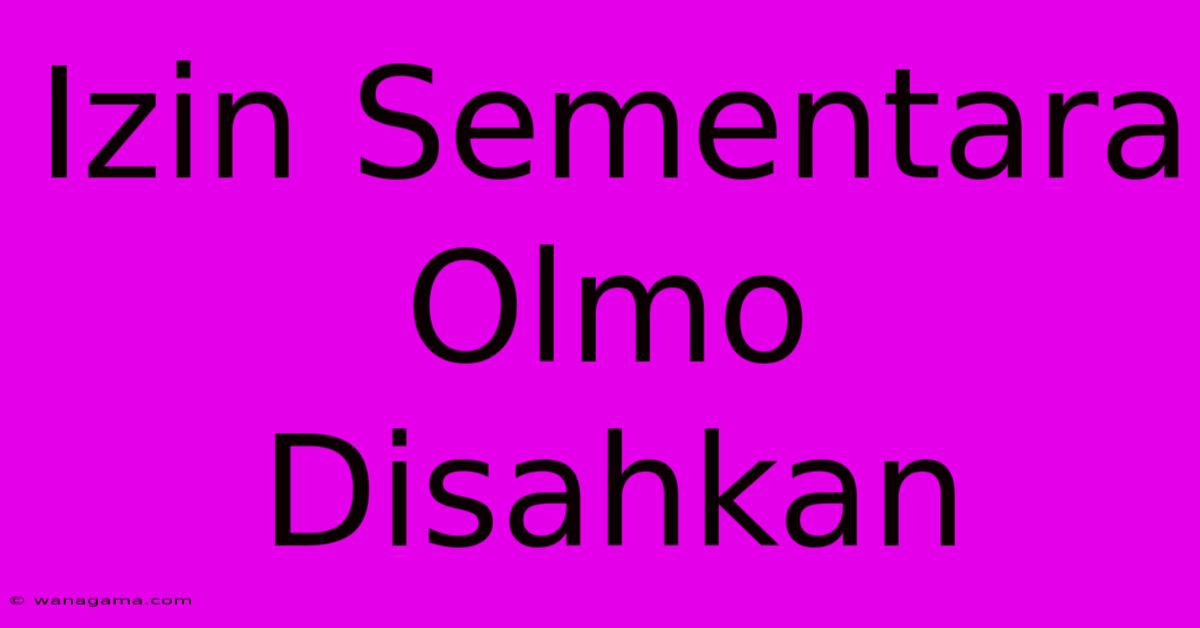Izin Sementara Olmo Disahkan

Discover more detailed and exciting information on our website. Click the link below to start your adventure: Visit Best Website mr.cleine.com. Don't miss out!
Table of Contents
Izin Sementara Olmo Disahkan: Mengurai Regulasi dan Implikasinya
Indonesia's dynamic regulatory landscape is constantly evolving, and recent developments surrounding the approval of Olmo's temporary permit ("Izin Sementara Olmo Disahkan") highlight the complexities and implications of such decisions. This article delves into the specifics of this approval, exploring its regulatory context, potential impacts on various sectors, and the ongoing discussions surrounding it. Understanding this situation requires a nuanced look at Indonesian law, economic factors, and the broader political climate.
Memahami Latar Belakang Izin Sementara Olmo
The approval of Olmo's temporary permit is not an isolated event but rather a consequence of several converging factors. To fully understand its significance, we must consider:
-
The Regulatory Framework: Indonesia possesses a robust system of regulations governing business operations, particularly in sectors deemed strategically important. These regulations often involve multiple government agencies, adding layers of complexity to the approval process. The specific regulations governing Olmo's operations likely involve aspects of environmental protection, industry standards, and potentially even national security, depending on the nature of Olmo's business.
-
Olmo's Business Activities: The type of business Olmo conducts heavily influences the scrutiny it faces. If Olmo operates in a sensitive sector (e.g., resource extraction, manufacturing of specific goods), the approval process will be more rigorous. Understanding Olmo's specific activities and their potential environmental or social impact is crucial to analyzing the implications of this temporary permit.
-
Economic Conditions: The current state of the Indonesian economy undoubtedly played a role in the decision. The government might be more inclined to grant temporary permits if they believe it will stimulate economic growth, create jobs, or attract foreign investment. Conversely, a period of economic uncertainty might lead to a more cautious approach.
Analisis Izin Sementara: Aspek Hukum dan Regulasi
The legal basis for Olmo's temporary permit must be examined carefully. Several questions demand answers:
-
What specific regulations govern this temporary permit? Identifying the precise legal instruments (laws, regulations, ministerial decrees) used to approve Olmo's permit is crucial for a thorough understanding.
-
What are the conditions attached to this permit? Temporary permits are rarely unconditional. They usually come with specific requirements regarding environmental protection, safety standards, employment practices, and reporting obligations. Understanding these conditions is vital to assess Olmo's compliance and potential liabilities.
-
What is the duration of the temporary permit? The timeframe allocated for this temporary permit is a key consideration. A shorter duration suggests a more cautious approach, possibly reflecting uncertainty or the need for further assessment. A longer duration implies greater confidence in Olmo's operations and their potential contribution to the Indonesian economy.
-
What is the process for renewing or extending the permit? The regulations should clearly outline the procedures for renewing or extending the temporary permit. This clarifies the path forward for Olmo and provides transparency for stakeholders.
Dampak Izin Sementara Terhadap Berbagai Sektor
The approval of Olmo's temporary permit could have far-reaching consequences for various sectors of the Indonesian economy and society:
-
Economic Impact: This approval could potentially stimulate economic growth in the relevant sector, create employment opportunities, and contribute to the country's GDP. However, negative impacts are also possible, including increased competition or environmental damage if not properly managed.
-
Environmental Impact: If Olmo's operations involve resource extraction or manufacturing, careful environmental assessment is crucial. The potential for pollution, habitat destruction, or depletion of natural resources needs to be carefully considered and mitigated. The government's commitment to sustainable development will be tested.
-
Social Impact: The influx of foreign investment or new jobs could positively impact local communities. However, potential negative social impacts should not be overlooked. These might include displacement of local populations, increased competition for resources, or social unrest if not properly managed.
Perdebatan Publik dan Transparansi
The approval of Olmo's temporary permit is likely to spark public debate. Transparency is crucial to ensure public trust and accountability. The government should proactively engage with the public, addressing concerns and providing clear information about the decision-making process, conditions attached to the permit, and plans to mitigate potential negative impacts.
Kesimpulan: Menuju Masa Depan yang Berkelanjutan
The approval of Olmo's temporary permit presents both opportunities and challenges. A thorough understanding of the regulatory framework, the conditions attached to the permit, and its potential impacts on various sectors is essential. Open dialogue, transparency, and a commitment to sustainable development are crucial to navigating the complexities of this situation and ensuring a positive outcome for Indonesia. Continued monitoring and evaluation of Olmo's operations will be essential in determining the long-term effects of this decision. This necessitates a proactive approach from both the government and relevant stakeholders to manage potential risks and harness the potential benefits. The success of this venture will serve as a significant case study for future regulatory decisions in Indonesia.

Thank you for visiting our website wich cover about Izin Sementara Olmo Disahkan. We hope the information provided has been useful to you. Feel free to contact us if you have any questions or need further assistance. See you next time and dont miss to bookmark.
Also read the following articles
| Article Title | Date |
|---|---|
| Operasi Bomba Sunset La Fire Department Beraksi | Jan 09, 2025 |
| Kebakaran Besar La Ribuan Ekar Terbakar | Jan 09, 2025 |
| Sunset Fire Kisah Kebakaran Los Angeles | Jan 09, 2025 |
| Tottenham Vs Liverpool 1 0 Keputusan | Jan 09, 2025 |
| Kemenangan Manis Barca 2 0 Lawan Bilbao | Jan 09, 2025 |
